A Community Built on Communication

(Grduate School of
International Studies)
Ewha starts its autumn semester with a new President of the University, its fourteenth since the founder Mary Scranton. I admit I am very happy about Professor Kim Sun-uk’s selection; not only is she a faculty member of the law school, my alma mater of sorts, but she was always well-regarded by those who knew her as a caring and fun professor, and a fair-minded and able administrator.
Early signs indicate that President Kim is bringing to her nascent administration the same qualities that made her so popular at the law school. She is taking steps to listen to various constituencies within the school, prompting input from professors, staff, and students alike. This is in keeping with her declared focus on participation and community.
Communication is definitely the right focus when it comes to building and improving the school community, but achieving consistent and broad-based communication is not necessarily easy. It is complicated by the fact that members of the community, including students, are not always proactive about making their concerns known to the school. How do we, as a school, become more effective communicators?
A basic knowledge of how humans act tells us that structural approaches are likely to work better than an exhortation to communicate. Actively soliciting input, as President Kim is doing, is a good start. It is also important to put persistent systems in place to address the community’s complaints and concerns, while giving such input public airing and due process to let the community know that they are being heard. Such institutional structures will go a long way toward building better communication, and thus a stronger community.
“Communication is definitely the right focus when it comes to building and improving the school community, but achieving consistent and broad-based communication is not necessarily easy .”
What concerns will emerge out of an open exchange of ideas? On the students’ side, their wish list appears to range from better teaching and more in-depth curricula to lowering the burden of school tuitions. In many cases, their wants and needs are reflective of the broader reality of higher education. Addressing these problems is a big task for any single school administration to tackle, but no one ever said advancing the school community’s core competence, as President Kim has committed to do, would be easy.
President Kim faces a hard four years of working to improve students’ lives and the school alike in rapidly changing social and economic conditions. She will need to form coalitions and induce consensus among groups with different views and interests, and to formulate—and continue—policies that will determine the future of Ewha. It is a difficult task, but I believe she is well up to it. And she will greatly increase her capacity to do her job by strengthening the Ewha community through active communication, a community willing to stand behind her no matter what.
Professor Lee Jee-hyung is a graduate of Ewha College of Law (graduated 2003) and of Georgetown University Law Center (2008). She is a Washington D.C. attorney who taught international law at the Division of International Studies at Ewha and currently at the Graduate School of International Studies.

